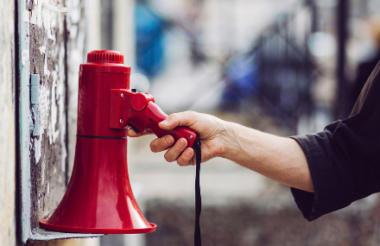These are times of great anxiety for the most marginalised in society. Zero hour contract workers, older people in care homes and disabled children with health conditions are just some of those at greater risk in this new reality.
Charities have responded swiftly to the unprecedented situation caused by the Covid-19 pandemic, protecting their staff, assuring finances, providing tailored advice and guidance, and maintaining and reimagining their operations.
But for the person who has had their cancer treatment cancelled, it provides little comfort. They need to know that charities will fight with them to secure the services they desperately need. Parents of children with Education Health and Care Plans need to know that the pragmatic weakening of their legal rights won’t become permanent – especially when many have fought tirelessly to secure those rights. And all of us need to know that we can trust someone to be thinking about how to mitigate the potentially devastating long term effects of this crisis on our livelihoods.
Over the past few days, we’ve seen a clear difference between charities genuinely connected to their communities and clear on their aims and values, and the notably silent. Charities have long been talking the talk on activism and campaign innovation. Now we’re seeing who walks the walk.
Pivot to new campaigns
For most charities, the current situation renders some campaigning priorities temporarily irrelevant. While it’s fine to pause a campaign, we mustn’t lose the intention behind it. Our own campaign on subtitled cinema screenings doesn’t work when people can’t go to the cinema. Yet because our aim was clear - that deaf children should be just as able to enjoy time with friends and family as their hearing peers - we can pivot to new campaigns that champion their need for social connections during this difficult period.
Charities like British Red Cross tackling loneliness or the Fawcett Society investigating the impact on women have also been able to pivot.
Holding government accountable
The Coronavirus Act has enacted the most stringent legislative powers since the War. Unchecked, these could significantly diminish the everyday protections we rely on. Holding government accountable is more vital than ever, but we need to get the tone right. This doesn’t mean shying away, it means being smarter and bolder than ever in our campaigning.
To do this, we must be firmly grounded in our communities’ concerns. The most connected charities like Inclusion London are out there, right now, confidently raising the issue of potentially devastating effects on social care, as are Hospitality Action, who swiftly responded to thousands of staff losing their livelihoods with pub and restaurant closures.
We need to play our part responsibly. Frontline health workers are risking everything for us and our role supporting their work by engaging our communities is critical. It’s important we share messages like ‘We came to work for you. Please stay home for us.’, find creative ways to engage people like Global Citizen’s ‘Together At Home’, support calls for NHS volunteers, and join in - like the beautiful moment when we stood on our doorsteps and thanked healthcare workers with rousing applause.
Adapt our approach to influencing
We’ll need to adapt our influencing approaches for the long period of physical distancing. It’s a sensible time to test digital organising and advocacy, but it can’t stop there. To remain relevant, we must clearly state our vision for the future and act as watchmen, so these temporary measures remain temporary. We must share our message in new, creative ways that engage people beyond their immediate concerns.
We must also seize this opportunity for fundamental change. The UK’s new social safety net measures aren’t far from a universal basic income – if we are passionate about these ideas, we must be more driven than ever to make them a reality. Those who will set the agenda during and after this crisis will call for transformational changes, communicated in practical measures. Take for example Save the Children’s National Plan for Family Finances.
And we must focus on the social and economic impact. Predictions for the post-coronavirus world are far bleaker than after the economic crisis of 2008. If we don’t closely monitor these effects and set a clear agenda to mitigate them, the legacy could wreck the lives of a generation. While China recovers, we are yet to see the scale of the effect in Africa or South Asia. We have long term lessons from other crises, like Ebola, which meant we had to be ready to work together in new ways to campaign, to make sure we bounced back stronger on issues like debt cancellation for countries with fewer resources, rebuilding health and care systems, supporting people’s livelihoods to recover and reshaping our global governance.
Now, and for the weeks ahead, we must keep up-to-date with national guidance, connect with professionals and families and communicate frequently, clearly and transparently, creating inspiring ways to share our messages. We must work together, being open and responsive to the concerns of those we represent.
And, critically, while we shield and support the vulnerable, we must keep campaigning together, more committed than ever to the causes we are entrusted with.
Steve Haines is executive director, policy and campaigns at National Deaf Children's Society
Related articles











